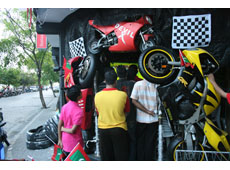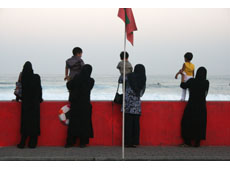Maldives police have said they are seeking the deportation of a foreigner who allegedly sought to spread Christianity on the island of Kinbidhoo in Thaa Atoll.
Missionary activities are illegal under Maldivian law, as is the possession of non-Islamic religious materials beyond those ascribed for ‘personal use’.
Police sergeant Ahmed Shiyam said while no charges had yet been laid, it was normal practice “to send a person suspected of this to their country of origin while the case is under investigation.”
Shiyam declined to reveal specific details of the allegations “as the case is still under investigation”, but noted that “the whole community is very concerned about this.”
Kinbidhoo islanders identified the man as David Balk, and said he had been living on the island for the past several years with his wife and three children, aged 10-13 years old.
“They all speak fluent Dhivehi and generally keep to themselves, but are very helpful and involved in social activities like beach cleaning,” said Island Councillor Mohamed Naseem, adding that media reports describing the man as English “are wrong because he has an American passport.”
Naseem said the islanders believed he was the managing director of a travel agency in Male, and that “whatever they were doing must have been secret because nobody here has complained about him [spreading religion].”
He added that the police investigation had been going on for some time “and only now have the media picked it up.”
Another resident of the island, Ahmed Rasheed, said Balk’s neighbours had seen inside his house and claimed he had never spoken to them about religion. “I’ve mostly seen him out fishing,” Rasheed said. “He always helps out islanders and at times has even given financial help to people.”
Rasheed said he doubted many of the Kinbidhoo islanders “would even know what a bible looks like.”
“The day the police came David’s wife went to the neighbours house to ask them to take care of a plant. She told them police were there ‘saying we are spreading Christianity’, and that while they had a bible, it was for their personal use,” he said.
“The islanders’ attitude is that while [the Balks] never talked to them about religion, they are suspicious of why the family have lived on island for a couple of years without an ulterior motive. But they say the feeling is not enough reason to throw somebody off the island.”
Abdullah bin Mohamed Ibrahim, president of Islamic NGO Salaf Jamiyya, told Minivan News “we have been watching these people for a long time. We have known of them since 2003.”
He said Salaf’s investigation was still ongoing, but that the NGO was “certain” Balk was a missionary.
The missionary group has a “rotating membership” that comes to the country and settles, he said.
“They are working under a long-term plan. They have given their children Dhivehi names and some even have tattoos in Dhivehi.”
Ibrahim said Salaf was aware of missionary activity in the Maldives, and of missionaries approaching people to proselytise.
Permanent Secretary of the Ministry for Islamic Affairs, Mohamed Didi, said that so far there had been no involvement in the case by the Ministry and “officially we don’t know anything.”
“If anyone complains we would ask the police to investigate,” he said, and if suspicions were confirmed, “basically the foreigner would be deported.”
Minivan News tried to contact Balk but was only able to speak to him briefly, as he said he was “going to spend time with my kids.”
 (0)Dislikes
(0)Dislikes (0)
(0)



